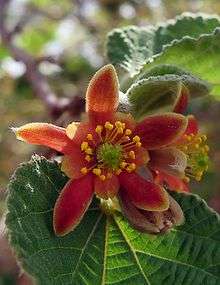Grewia villosa
Grewia villosa is a shrub, often scrambling and hardly exceeding 4 m in height. Leaves are fairly large, serrated and heart-shaped. It grows naturally, mainly in dry habitats. It is common in most of the semi-arid parts of Eastern Africa but may now be rare in parts of its natural distribution. Seen in Ein Gedi oasis in Israel, common in South Africa. Its ripe copper-coloured fruits are eaten in East Africa.
| Grewia villosa | |
|---|---|
 | |
| Scientific classification | |
| Kingdom: | Plantae |
| Clade: | Tracheophytes |
| Clade: | Angiosperms |
| Clade: | Eudicots |
| Clade: | Rosids |
| Order: | Malvales |
| Family: | Malvaceae |
| Genus: | Grewia |
| Species: | G. villosa |
| Binomial name | |
| Grewia villosa | |
| Synonyms[1] | |
| |
Uses
The fruit of the Grewia villosa were eaten both while immature and green and also once they had ripened and hardened to a dark, reddish-brown. The bark was stripped off and crushed in water or chewed to a pulp which was used to wash the body as well as to clean the hair and disinfect the scalp [2]
gollark: Ligature good, sometimes.
gollark: I have implemented a three-way mechanics switch.
gollark: (note: checkboxes not present in public version)
gollark: You really should undergo gaming.
gollark: Unlike osmarkscalculator™, potatOS™, RSAPI and the RSAPI Diagram™, etc.
See also
- List of Southern African indigenous trees
References
- http://www.theplantlist.org/tpl/record/kew-2833491
- G. Miller, Anthony; Morris, Miranda (1988). Plants of Dhofar. Oman: The Sultanate of Oman. p. 284. ISBN 071570808-2.
- Maundu, P. M. ; Ngugi, G. W. ; Kabuye, C. H. S., 1999. Traditional food plants of Kenya. Kenya Resource Centre for Indigenous Knowledge, National Museums of Kenya, 270 pages
This article is issued from Wikipedia. The text is licensed under Creative Commons - Attribution - Sharealike. Additional terms may apply for the media files.